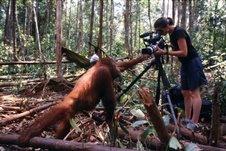Friends of the Earth and Ape Alliance 's Palm Oil Campaign wins Observer Food Monthly award
Press Release:
Friends of the Earth and Ape Alliance 's Palm Oil Campaign wins Observer Food Monthly award
Mar 22 2007
Friends of the Earth and Ape Alliance have won an Observer Food Monthly (OFM) Award for their campaign to help stop the trade in palm oil from driving the Orangutan towards extinction. The campaign was launched in 2005 in partnership with the Ape Alliance Palm Oil Working Group, which includes Orangutan Foundation, Sumatra Orangutan Society, Borneo Orangutan Survival Foundation and Cockroach Productions.
Palm oil is found in one in ten products on the su permarket shelves including bread, crisps, margarine and cereals to lipstick and soap. The clearance of large tracts of rainforest in east Malaysia and Indonesia for palm oil plantations is the primary cause of the Orangutan's decline - as well as thousands of other species – these are some of the most bio-diverse forests on earth!.
Since its launch the campaign has notched up many successes including:
Attracting global attention to the devastating impact which the palm oil industry has on the Orangutan, their rainforest habitat and the communities who live alongside them.
Highlighting the need to strengthen company law so that companies are legally required to report on the social and environmental impacts of their supply chains.
Persuading all the major supermarkets to join a Roundtable on Sustainable Palm Oil. The Roundtable is an association of business and non governmental organisations seeking to promote sustainable palm oil.
Helping to stop a mega palm oil plantation in Borneo, . The plantation would have led to the destruction of two million hectares of pristine forest - an area the size of .
Friends of the Earth is continuing to campaign to ensure UK supermarkets deliver on their pledge to use only sustainable palm oil and is working to ensure that the growing demand for biofuels doesn't lead to even greater destruction of the Orangutan's home forests. The organisation is calling on the UK Government to ensure no palm oil is imported for bio-fuel.
Friends of the Earth Palm Oil Campaigner, Ed Matthew said:
"We are delighted to have won this award. We have achieved a huge amount over the last few years but the sad fact is that the rainforest in and continues to be destroyed at an alarming rate and the Orangutan is still gravely threatened. Now the use of palm oil as a bio-fuel could push the Orangutan over the edge. The UK Government must ensure no palm oil is imported for use as bio-fuel."
The Ape Alliance Palm Oil Working Group has produced a postcard for people to send to their MPs and MEPs on the issue of palm oil and bio-fuels. Click here to find out more.
Friends of the Earth's Ed Matthews, with Helen Buckland of SOS and Ian Redmond of Ape Alliance, received the award from Alex James of Blur and Nicola Jeal, editor of OFM at a ceremony in London on 22 March. The awards, now in their fourth year, recognise and reward those who have made a contribution to the food industry for the better.
Winners were selected by a combination of OFM (OFM) reader votes and a celebrity judging panel which included: cookery expert Nigel Slater; Ruth Rogers, of the River Café; Tom Conran, restaurateur; Joanna Blythman, food writer; Jay Rayner, Observer restaurant critic; Robbie James, Waitrose; Caroline Boucher, deputy editor OFM and Nicola Jeal, OFM editor and chair of the judging panel.
For further information, contact:
Ape Alliance : 01453 765 228 or visit www.4apes.com/palmoil for contact details of the Ape Alliance Palm Oil Working Group members.
Check out the video evidence at www.films4.org/palmoil
Contact Nick @ Films4Conservation: 01823 451 790; nick@films4.org
Friends of the Earth
26 - 28 Underwood St.
LONDON
N1 7JQ
Tel: +44 20 7490 1555
Fax: +44 20 7490 0881





